

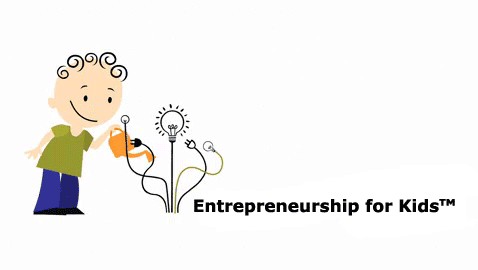
This page describes numerous experiences of students, teachers, and educators as they learn about the Entrepreneurship for Kids (EFK) Program in Israel and around the world. This is the second page about the program's experiences.
This page was created after Google warned that the first-page "Experiences from the program" was loading slowly because it had too much content, and in light of the accumulation of many other events and experiences that we want to share with you.
You can visit both pages, as they are updated periodically. If you have not yet visited the Kids Initiate page and the More Projects by Kids page, it is recommended that you do so. You will be impressed by the great work of the young entrepreneurs.
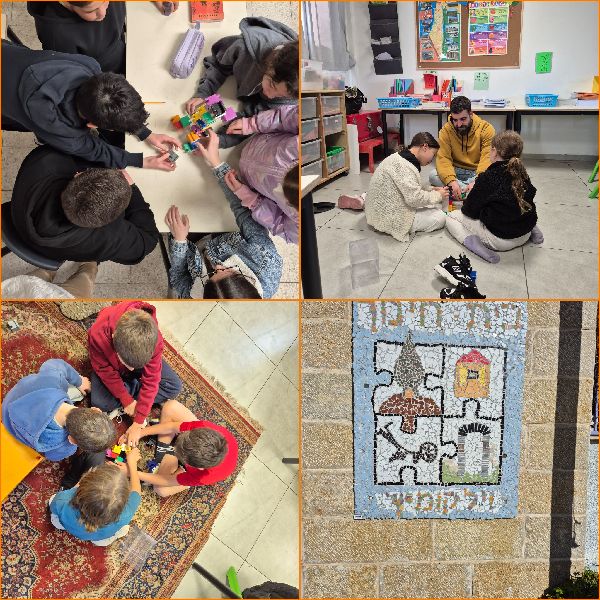
A creative thinking workshop for students at Vilkomich School.
Two days of workshops led by Galit Zamler for the students of Vilkomich School.
During these two days, students from grades 3, 4, 5 and 6 participated in a creative thinking workshop.
The workshop was adapted to each age group, ensuring that all students gained value and enjoyed the experience.
At the conclusion of the workshop, the school principal, Vicky Modelinger, presented Galit with a warm letter of recommendation.
"To whom it may concern,
I would like to recommend the creative thinking workshop led by Ms. Galit Zamler for students in grades 3, 4, 5, and 6.
The workshop focused on developing creative thinking as a way to view problems and challenges from new perspectives, and on connecting creativity with entrepreneurship. Galit worked with entire classes and succeeded in creating an open, engaging, and thought-provoking dialogue, in which every student felt that their voice and ideas were valued.
Throughout the workshop, students were exposed to a wide range of examples from everyday life and from history - ideas that were initially considered unconventional or unacceptable, but ultimately led to change and success. Through these examples and discussions, students learned the importance of having the courage to think differently, to experiment, and to persist even when not everyone supports your idea.
The workshop also included experiential and playful activities, in which students worked in teams and actively challenged their thinking. The students demonstrated creativity, collaboration, and the ability to face shared challenges in a supportive and enjoyable atmosphere. It was evident that the activities sparked curiosity, interest, and high levels of engagement throughout the workshop.
The workshop contributed not only to the development of creative thinking but also to strengthening the students??? confidence in their ability to present ideas, express themselves, and think independently and creatively. Students continued to talk about the workshop even after it ended and expressed a desire to further explore the field.
I highly recommend this workshop and its integration into educational frameworks that seek to cultivate creativity, entrepreneurship, and open-minded thinking among students.
Sincerely,
Vicky Modelinger
Principal, Vilkomich School
Rosh Pina"
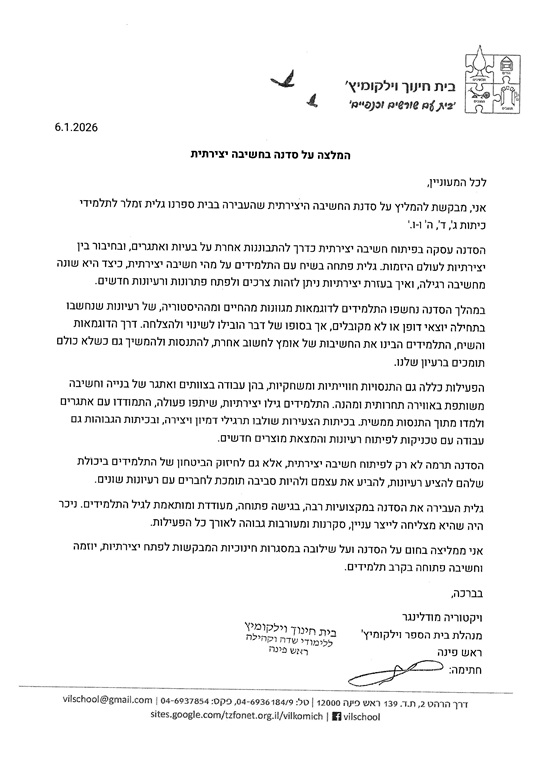
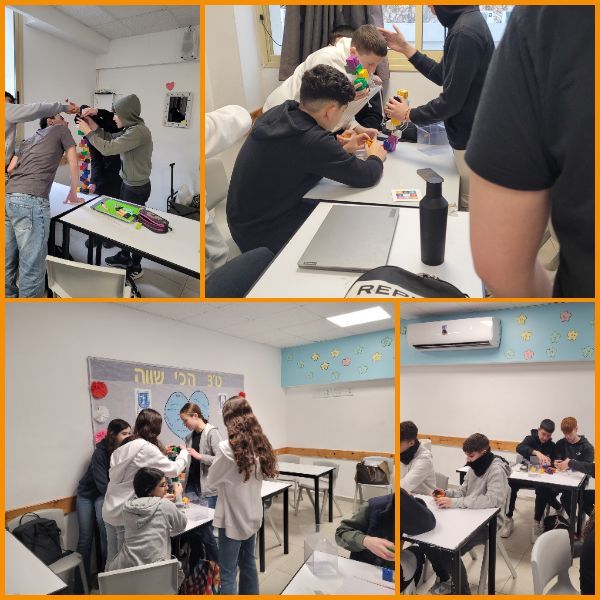
Ninth-grade students at Ort Shimon Peres in Yokneam participated in the "Hand in Hand with Israel's Heroes" hackathon.
The hackathon challenge was to develop artificial intelligence-based technological solutions for veterans with limb injuries from Operation Iron Sword.
To ensure students were prepared for the hackathon, Dr. Dina Falikovich, the Chemistry Coordinator, organized a series of preparatory meetings.
One of these was a workshop on creative thinking oriented toward the hackathon's purpose.
The students learned creative thinking techniques and experienced hands-on activities.
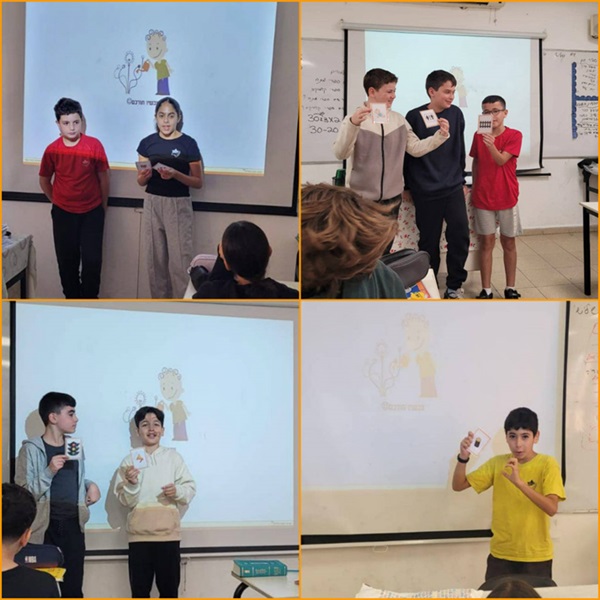
Galit Zamler delivered four entrepreneurship lessons to 5th- and 6th-grade classes at Ramon School in Rehovot, under the guidance of Principal Pnina Weinstein.
Galit thoroughly enjoyed the sessions and wished for more time with the students, as each topic sparked tremendous interest and could have been explored in greater depth.
The school posted on Facebook after the four meetings:
"Realizing Dreams at Ramon
We have reached the end of the first part of the Entrepreneurship for Kids program led by Galit Zamler.
The entrepreneurship program develops and encourages students in independent and positive thinking, identifying opportunities, critical thinking, asking questions, research, listening to others, teamwork, believing in yourself and your abilities, setting goals and objectives, and persevering until achieving them, taking responsibility, creativity, standing in front of an audience, and more."
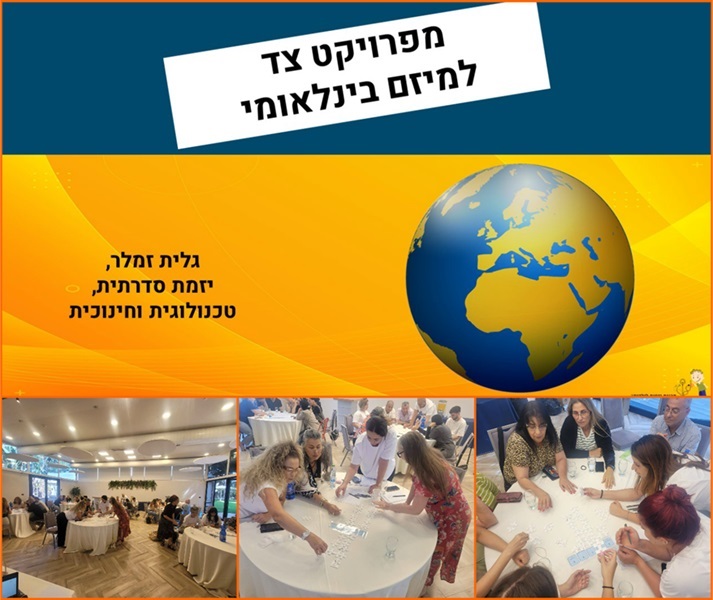
"From a side project to an international initiative"
This was Galit Zamler's inspirational talk to the Educational Management Cadre in Acre last week. It was part of a seminar led by ORT Israel.
Galit shared how she managed to transform a voluntary initiative into a significant international project.
She presented the projects she had established over the years. Most of them failed, but 35% succeeded overall, which is considered a remarkable statistic.
However, this statistic is not a consideration when developing a project, and as entrepreneurs, we do everything possible to succeed.
Galit explained how important it is for entrepreneurs to take calculated risks so they don't lose everything in case of failure.
The central part of the lecture was about the Entrepreneurship for Kids Program.
Taking away from the lecture: We don't need to be perfect to start initiating and making an impact. We need to do our best and continually improve as we move forward.
The image shows an activity that Galit Zamler conducted for the participants, demonstrating the importance of entrepreneurship education.
The non-formal education department of Herzliya Municipality invited Galit Zamler to conduct two experiential workshops again.
One workshop for parents and children, titled "Thinking Outside the Box," focuses on creative thinking.
A second workshop for children, focusing on public speaking, is called "Conquering the Stage."
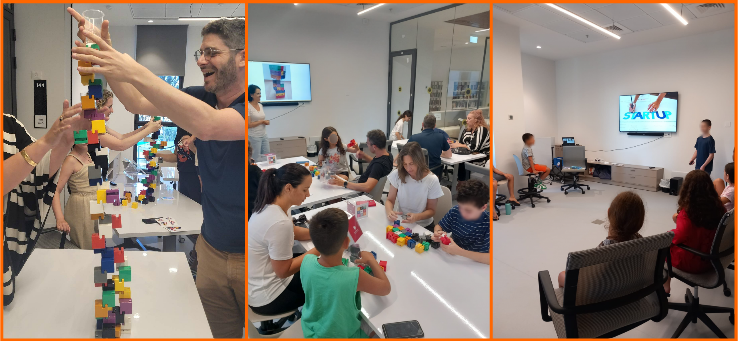

A summer camp focused on entrepreneurship was held in Vietnam several times, featuring a variety of activities, workshops, and lectures designed to develop entrepreneurial skills among children.
The children also had online meetings with Galit Zamler.
Meetings were conducted through trivia questions. It was surprising to discover the extent of knowledge the Vietnamese students had about Israel.
The children shared with Galit which regions of their country she might like to visit and taught her about their traditional foods and clothing.
Each side taught the other a few words in their language during the meetings.
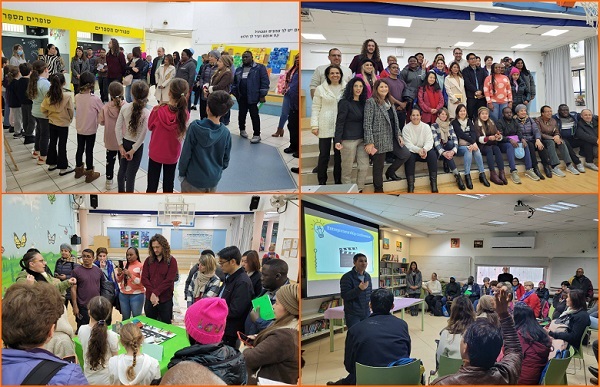
Under Amalia Swisa's leadership, Ramot Weizmann School hosted a delegation of educators from the Ministry of Foreign Affairs for the second time.
Members of the delegation came to Israel from 18 countries to learn about entrepreneurship education up close.
During the visit, the school staff and students presented their extensive entrepreneurial education activities to the guests. They also presented how they cultivate students' skills and prepare them for a prosperous future.
During the visit, the chairman of the parents' committee presented the parents' perspective on all aspects of the school, as well as the cooperative efforts that benefit the students.
The mayor also arrived briefly and greeted the guests.
At the end of the visit, the delegation members participated in a workshop conducted by Galit Zamler. The workshop illustrated the entrepreneurship process that the students undergo at the school.
In fact, the delegation members were very impressed with what was happening at the school and saw it as a role model.
The director of Hagimnasiya Harealit in Rishon Lezion, Iris Ron, and her deputy, Michal Keren, asked Galit Zamler to organize visits to high-tech companies and innovation centers for 9th- and 10th-grade students. The visits were intended to inspire the students before participating in a hackathon on "Creating a Better Future."
The students visited different places and shared their experiences at school.
Students from two classes visited the Volcanic Institute. There, they learned about agricultural and food innovations.
A visit to the Space Center of the Aerospace Industry left a tremendous impression on one class regarding Israel's capabilities in satellite communication.
One class visited IronSource, a high-tech company that develops tools to generate revenue from game applications. Our thanks go to Shani Kahani, Corporate Social Responsibility Manager, for her enriching and fascinating visit.
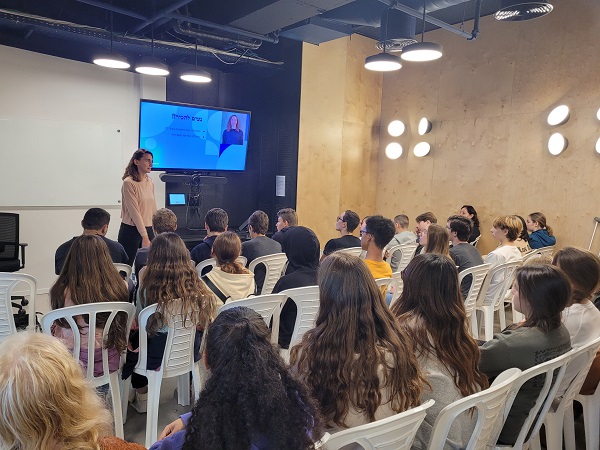
Students in another class visited Dr. Doron Myersdorf's StoreDot company. Noa Kotok, the company's marketing manager, led the visit. The students learned about the company's innovative thinking, the determination to succeed, and the development processes for producing a battery for electric vehicles that will make us all want to drive one.
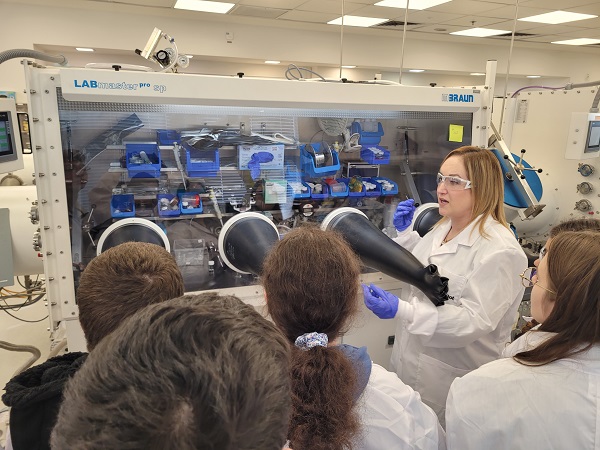
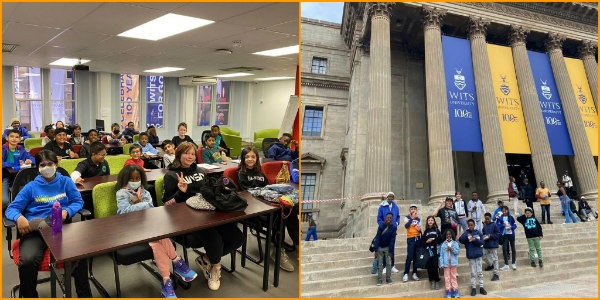
In South Africa, the EFK program is taught in Montessori schools. A visit to the Wits University Transnet Matlafatso Innovation Center inspired 25 students, aged 9-15, who are attending an entrepreneurship course.
Two sixth grades at Katznelson School in Kfar-Sirkin completed a three-month entrepreneurship course led by teacher Lee Glick.
Having observed the students presenting their ideas for projects, Galit Zamler invited a delegation called "Teachers for the Future" from Germany to learn about the significant process the students went through and their creative ideas for the projects.
The delegation members were delighted to see the students pitching and were impressed that the school allows students to dream and lets them implement their ideas.
The meeting with the delegation members, who cheered the students, empowered them, gave them a sense of purpose and meaning.

The "Entrepreneurship and Innovation" class at Ramot High School in Bat Yam visited the Design Museum in Holon as part of the Youth Entrepreneurship program.
The students visited the museum's exhibition, "Albar Elbaz's Dream Factory". They participated in a workshop called "Design-as-a-Solution to a Problem," involving designing a citrus fruit carrier out of reflective fabric.
In this workshop, students were asked to generate ideas and devise solutions to problems that exist in the world.
Nurit Kakuli, the curriculum coordinator, and Reut made the visit possible.
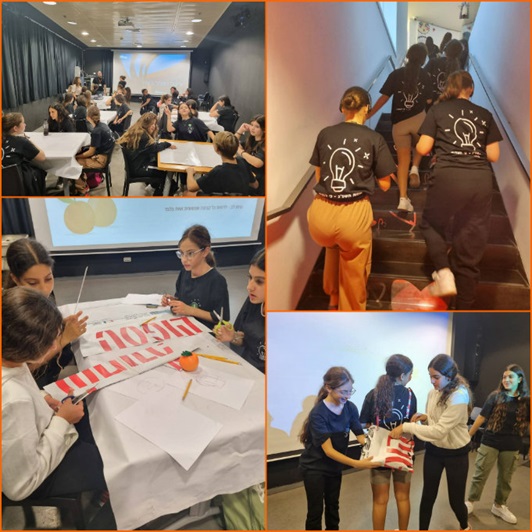
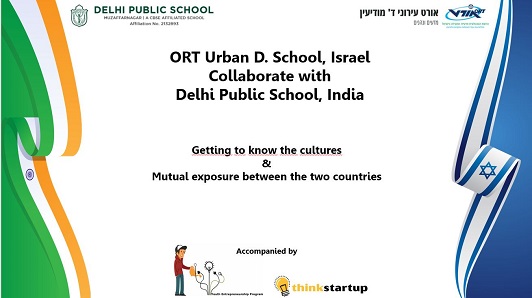
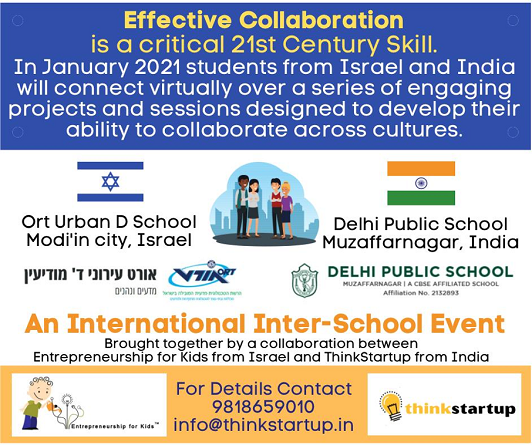
As part of the entrepreneurship classes in the eighth grades, we held an international event for Ironi D High School students in Modiin and the public school students in Delhi, India.
Both schools are teaching the skills of entrepreneurship, which are increasingly important in today's world.Both schools are teaching the skills of entrepreneurship, which are increasingly important nowadays.
This event is part of a joint project aimed at introducing the two countries and their cultures.
The event was opened by Mrs. Revital Aka, Principal of Ironi D High School, and Mr. Anupal Sagar, Principal of a public school in India.
The students from both countries uploaded various questions they were curious about the other country onto a shared Padlet wall. Before the event, each side answered the questions. In the meeting today, after we played a quiz game about inventions and developments, we discussed a selection of questions that appeared on the Padlet wall. The connections between both schools and countries add interest and enrich the world of the students.
The event was made possible thanks to the teacher Ester Menachem, one of her kind, and with the help of Shivani Kapoor from India, who leads an entrepreneurship program.

During an online entrepreneurship course for fourth and fourth-graders at Kochav Hatzafon in Ashkelon, students became acquainted with various concepts from the entrepreneurial arena, learned to identify their strengths, came up with ideas for ventures, researched and developed them to the best of their ability, and learned to present them to an audience like mature entrepreneurs.
On the last day of the course, thanks to a fruitful collaboration with Pnina Weinstein, the principal of Hayovel School in Ashdod, the students held a meaningful and empowering graduation meeting in the style of the TV show "The Shark Tank."
The Northern Star School students were the entrepreneurs, while students and graduates of Hayovel School were the "sharks."
Each entrepreneurship class was assigned to a dedicated encounter with the "Sharks," so each entrepreneurship team received full attention.
The joint meetings aroused excitement and interest among the students. It was a pleasure to see the young entrepreneurs present their ideas, and the "sharks" give empowering and encouraging feedback.
The Entrepreneurship Program for Kids in Vietnam resumed leading courses for children and teens in response to the easing of the lockdown caused by the pandemic.
The staff in Vietnam believes in imparting skills and abilities related to the entrepreneurship field to prepare children for the future.
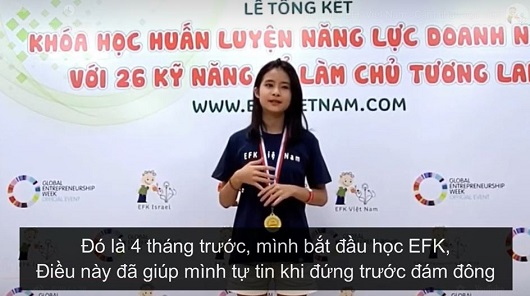
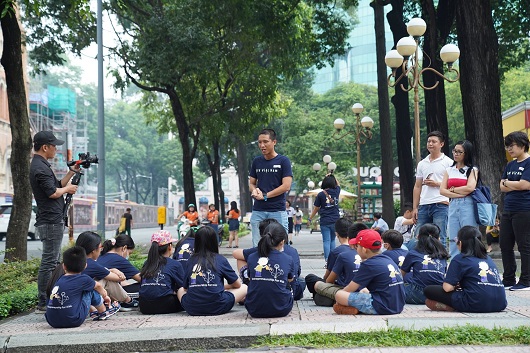
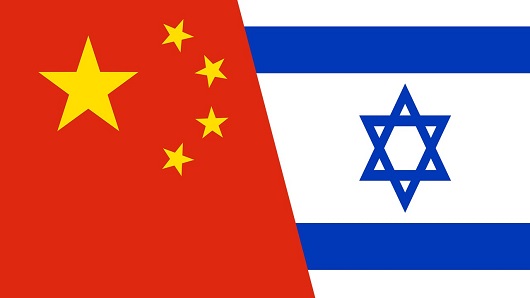
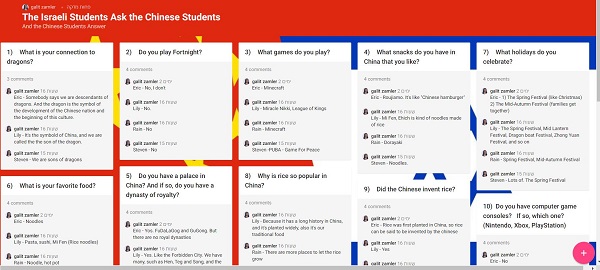
Galit Zamler led a collaboration between students of the China School of Languages, who participate in a yearly entrepreneurship course directed by her, and the students of A.D. Gordon School, whom she has accompanied for several years on the subject of entrepreneurship education.
During this collaboration, the Israeli students posed questions to the Chinese students on a shared online board (Padlet), and the Chinese students asked the Israeli students on another shared board.
On stage two, each side received a link to the board with the questions they were asked about, and the students answered the questions.
After that, we held an online session with students from Israel and those from China. We broke the first awkwardness with an entrepreneurship game. After the game, the students were comfortable and willing to chat and share some of their culture and everyday lives.
The students from both countries enjoyed the activity and the meeting. Both sides requested to schedule additional sessions in the future.
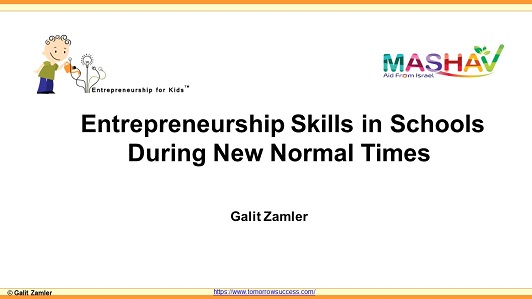
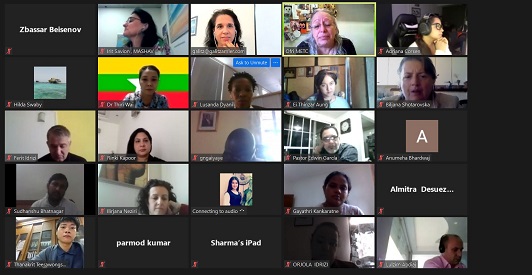
Every year, MASHAV - Israel's Agency for International Development Cooperation, Ministry of Foreign Affairs, hosts educators from developing countries to learn from Israel.
There is a particular emphasis on entrepreneurship education, and Galit Zamler usually accompanies the delegations to schools that teach entrepreneurship and teach the Entrepreneurship for Kids Program.
This year, due to the pandemic constraints, the concept is a bit different. Instead of coming to Israel, the Foreign Ministry asked Galit Zamler to deliver an online course of four sessions to leading educators on Entrepreneurship Skills in Schools During New Normal Times.
In the first meeting, we talked about Israel as an entrepreneurial state and the importance of entrepreneurship education from an early age in schools.
In the second session, we discussed the process of entrepreneurship education in practice and how to implement it in a fun, enriching, and empowering way.
In the third session, we discussed entrepreneur skills, how to develop these skills within the educational system, and their importance for every boy and girl.
In the fourth session, the educators participated in a virtual hackathon. For most of them, it was their first experience. They enjoyed the intensity of the event and finally presented the ideas they've developed on the challenges of education and the loneliness created during the COVID-19 pandemic.
Among the participants are teachers, school principals, professional coordinators, lecturers, and deputy principals.
As can be seen on the map, the participants are from Nepal, Kazakhstan, South Africa, Panama, Costa Rica, El Salvador, Tanzania, Kenya, India, Sri Lanka, Thailand, Vietnam, Nigeria, Albania, Macedonia, Kosovo, Malawi, and Myanmar.
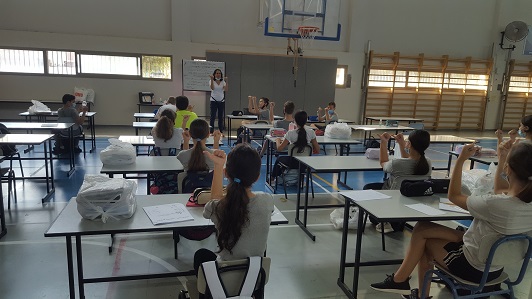
Last year, sixth graders participated in an entrepreneurship course led by Galit Zamler.
The course was halted due to the COVID-19 pandemic.
This year, after the EFK program was adapted for online learning, all fifth graders and all sixth graders participated in an online entrepreneurship course led by Galit Zamler.
Each class is assigned a weekly hour in the curriculum, and students learn from their homes.
Before the course began, Galit Zamler arrived at the school for an exposure session to coordinate expectations. In this meeting, fifth graders participated in a short activity that demonstrated their ability to think creatively and differently than they usually do.
Sixth graders were given an exercise that seemed simple but, in practice, proved to be a bit confusing. They are all practicing presenting a perfect performance in the first online lesson.
This exercise teaches students that with determination and practice, they can succeed.
Galit Zamler shares: "Teaching the students, even when it's on Zoom, is a wonderful experience! Especially when it comes to entrepreneurship lessons. Students feel free to express their opinions, ask questions, and challenge the obvious in our lessons. I enjoy the lessons so much, and I offer them the stage to share their thoughts and ideas. The only problem is that we lack time. The lessons are ending too soon, but that's how it is when you have fun :)"
The fifth-grade students generated ideas for enhancing both the online learning experience and the in-school experience.
Firstly, we gathered all the suggestions, and then, through a survey in each class, we selected the best ideas, which we will present to the school staff, hoping that some of our ideas will be implemented.
The sixth-grade students are continuing to work on their venture ideas, which they developed last year, with the same teams.
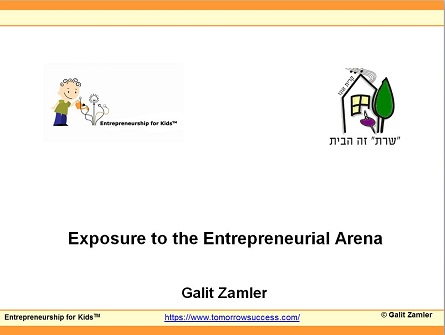
At the request of Hagit Cohen Fox, a science coordinator at the Sharet School in Kiryat Ono, Galit Zamler gave a lecture on entrepreneurship for sixth graders.
As the name of the lecture, so was its purpose: to expose students to the entrepreneurial arena.
The students are going through a process of identifying needs and finding technological solutions in the context of the nearby park and the community that visits it.
The lecture, which combined fun activities and discussion, encouraged the students to think like entrepreneurs, making them realize that each of them could come up with a good idea and that it was worthwhile to be aware of their environment and open to different suggestions.
A delegation from Uganda, led by the Deputy Minister of Education, has visited the A.D. Gordon School, which Gila Ben-Yosef manages.
The delegation had arrived in Israel via MASHAV, an agency of the Ministry of Foreign Affairs, to gain a closer look at how schools in Israel encourage entrepreneurial thinking and groom proactive pupils.
The delegation members learned how the A. D. Gordon School serves as an entrepreneurship hub, allowing each one of its pupils to express themselves. The delegation members also learned how teachers function as mentors for the pupils.
For several years now, Galit Zamler has been supporting the school in its educational process for entrepreneurship and is proud to see that the school staff and pupils implement an entrepreneurial culture in their day-to-day lives.
Joined on the visit were Orit Liebovitch, the principal of the primary school in Kefar Saba, and Gila Zilberstein-Castiel, the school's inspector on behalf of the Ministry of Education.
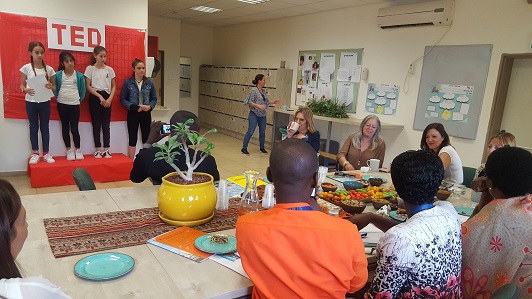
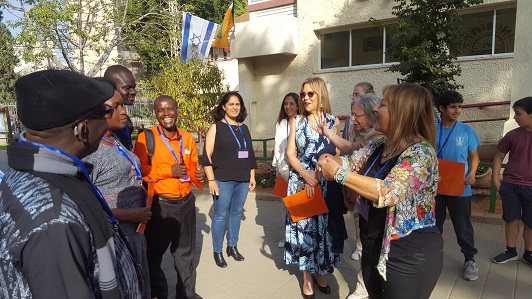
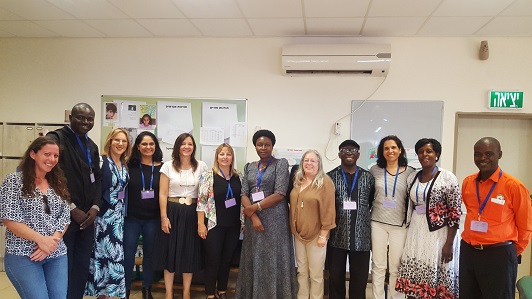
A delegation of school principals and private school owners from Mexico visited the Hayovel School in Ashdod, headed by Pnina Weinstein.
The pupils' representatives led the tour. They introduced the various curricula the school offers to its students, as well as the versatile and innovative teaching methods, which are intriguing to the pupils.
The delegation members thanked the school staff for the inspiring visit and the meticulous preparation that had gone into it. They mentioned that they were very impressed by the courage to lead innovative learning processes in public education.
The Nadav Democratic School in Modi'in opened a Youth Entrepreneurship Center this year, headed by teacher Yuval Geffen, based on the Youth Entrepreneurship Program.
At the center, teens learn about technological entrepreneurship, social ventures, and other related topics. They also know what it takes to be an entrepreneur.
Students participating in the Entrepreneurship Center will develop project ideas and present them at the end of the year.
Already at the first entrepreneurial sessions, the students learned about the importance of teamwork, planning, assigning group roles, and more.
The youth built straw towers, which were evaluated based on criteria of height, stability, and creativity.
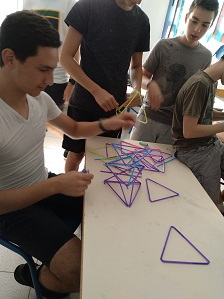
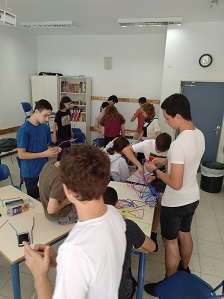
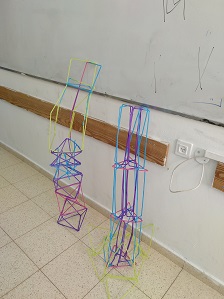
Galit Zamler led a workshop for a group from China, hosted in Israel, for parents and children aged 7-14.
The workshop was held at the Sarona-hub for Youth Entrepreneurship in Tel Aviv.
The group learned about Israel as an entrepreneurial and innovative country, as well as the importance of developing entrepreneurial skills, recognizing that each of us needs to cultivate these skills.
After identifying participants' strengths through a game, they worked in groups to develop ideas for ventures and presented them via elevator pitches in both Chinese and English.
At the end of the event, we held a contest and announced the winning idea. The group that conceived it received a symbolic award.
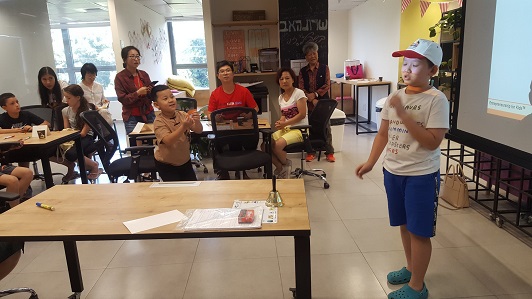
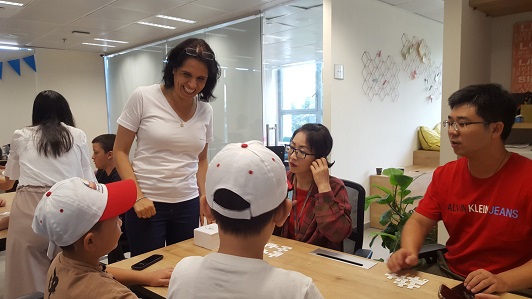
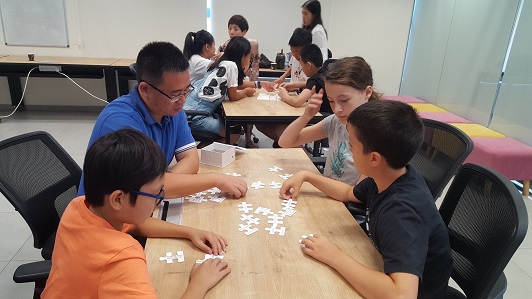
A delegation of senior South Korean educators arrived in Israel as Foreign Ministry guests.
Galit Zamler led a workshop to the delegation during which they learned why it is important to start an entrepreneurship education from an early age, why they should do this in schools, and how to do it successfully.
They also learned about the teacher's role as a student mentor and the entrepreneurship education process.
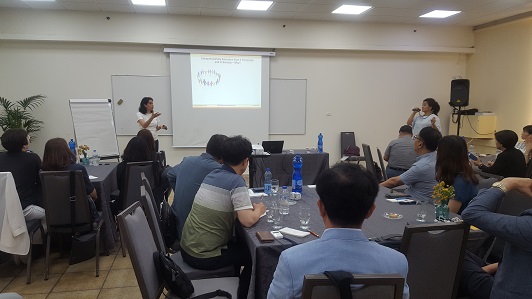
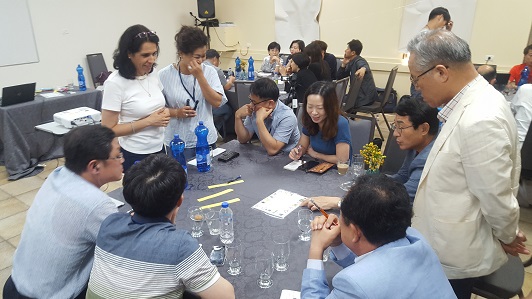
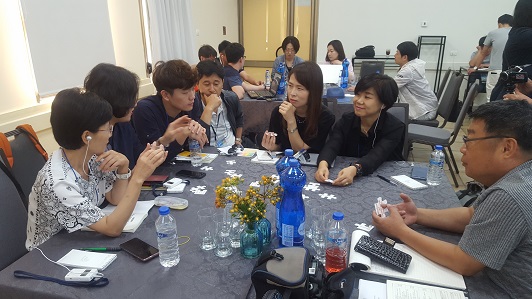
A delegation of senior education officials from developing countries was the guests of MASHAV, the international aid agency of the Ministry of Foreign Affairs. The A.D Gordon School in Kfar Saba hosted the event.
The purpose of their visit was to learn how Israeli schools educate for entrepreneurship, starting at an early age.
The A.D. Gordon School, under the direction of Gila Ben-Yosef, teaches entrepreneurship with guidance from Galit Zamler.
The delegation members were impressed by the school's ability to foster creative and independent thinking among the children, tailored to their individual capabilities.
Here is a summary of the successful visit:
Read part of the gratitude letter, the Ministry of Foreign Affairs wrote to the school:
"In our meeting with you, we received understandable explanations of your educational and value-based activities. We liked the combinations of space, practice, and experience. The pedagogical processes, quality of learning, and the wide variety of educational work, along with the possibilities for more curriculum, were also impressive. We took note and were fascinated by the countless options and examples of flexible learning.
Our visit aroused thinking about what needs to change and how it can be accomplished and improved. New ideas, challenges, and teaching methods excited the participants.
The model for this program is inspiring. Seminar participants benefited greatly and asked that we thank each of you for sharing your knowledge, for your impressive and warm reception and attitudes, and for your evident educational professionalism."
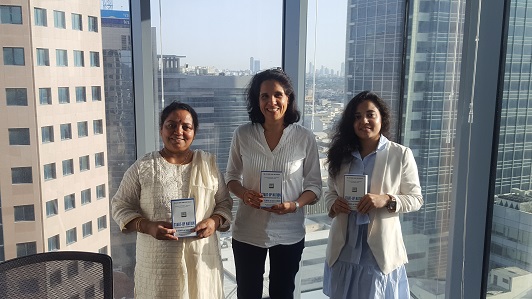
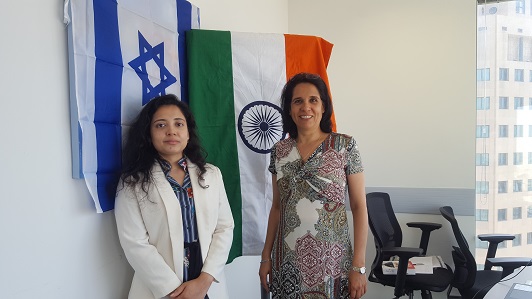
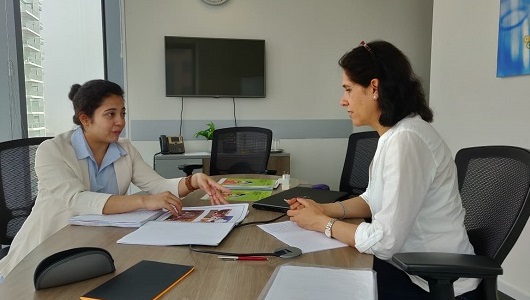
The Indian team from Carengrow Company, led by Dr. Meghana Kambham, visited Israel for a week of entrepreneurship education training as part of the Israeli Entrepreneurship Program for Kids.
The team defined its purpose for visiting Israel. They wanted to bring and deliver seeds of Israeli success in India, to spread them among the children and set them up for future success like the state of Israel.
The motivation for sharing the entrepreneurship program with India is to train future generations and provide them with the needed skills for future success.
Israel21C magazine wrote about India and Vietnam. Companies from both countries acquired licenses to teach the program within their respective states.
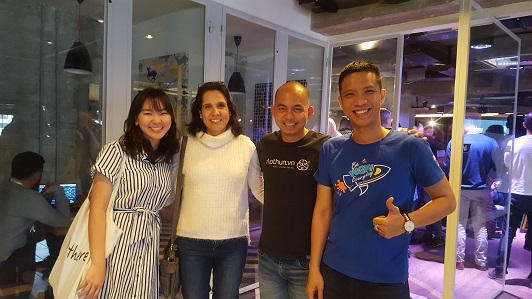
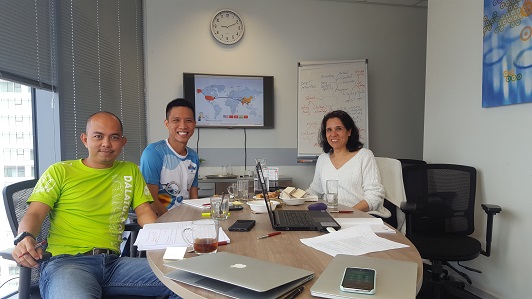
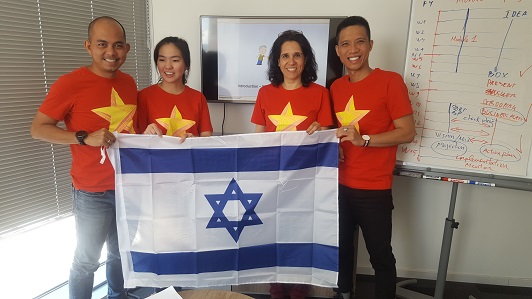
Vietnam team leaders, Mr. Bui Do Nguyen, Mr. Nguyen Phuong Nam, and Mrs. Chau Buu Hoa, came to Israel for training to implement the EFK Program in their country.
Along with the enjoyment of learning, the team was impressed by the knowledge and methodology developed by Galit Zamler for teaching children entrepreneurial skills at a young age.
It appears that when it comes to skills vital for success in life, in a world that is becoming one global village, the same skills are not only crucial in Israel but also essential in Vietnam.
The team defined their arrival in Israel as a journey meant to bring back knowledge to Vietnam. This knowledge will elevate the children's strengths and encourage them to fulfill their dreams.
During the training, one team member said, "This program is defined as an entrepreneurship program for children, but I believe it is suitable for businesses, business owners, and even for myself."
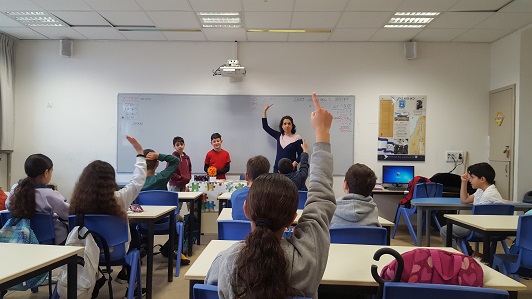
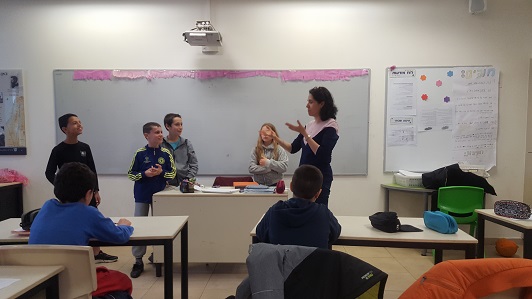
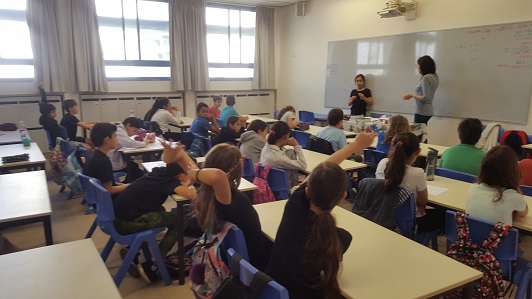
Students from the Yizhak Navon School learned entrepreneurship lessons this year as part of the Entrepreneurship for Kids Program and are currently preparing for an event scheduled to take place at the end of the year. At this event, the children will present to their parents the entrepreneurial process they have gone through.
Galit Zamler held two meetings with third, fourth, and fifth graders, in which the children presented their ideas for projects, some social, and some based on inventions.
The children were interested and asked about the subject of copyright, so we expanded on the topic and also discussed trademarks. The children knew the symbols, but not their meaning.
Third graders planned their initiative in detail, including defining uniqueness and differentiation, when the ultimate goal was to purchase tents for people experiencing homelessness.
At the end of the project, Galit wrote: "One of the things I teach the kids about is Storytelling, which is based on the question, 'How did the idea come up?'. Sometimes, they don't remember because their idea has undergone multiple changes; at other times, they know immediately, such as the group that conceived an advanced wheelchair???an idea sparked after a student sat on his grandmother's friend's wheelchair and realized how difficult it was to move.
The open attitude and creativity in the classrooms allowed students to come up with more ideas throughout the meetings, and that in itself is a great experience."
The teachers who attended these meetings stated that they were happy to have more of these mentoring sessions.
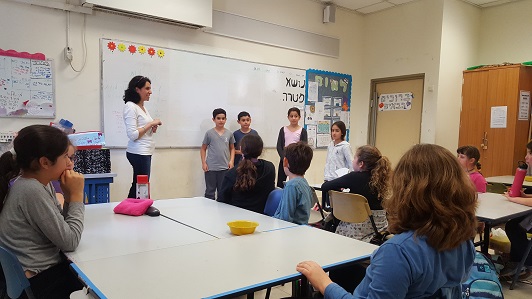
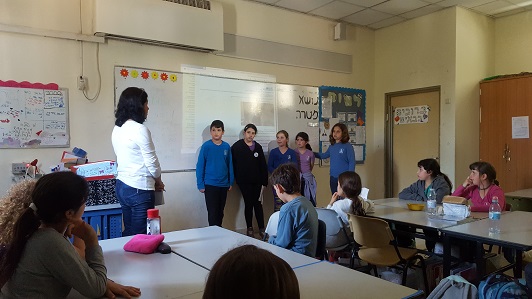
Students in a fourth-grade classroom in the A. D. Gordon School presented their project ideas, social initiatives, and inventions to Galit.
Galit listened to the students and provided them with feedback that would help them achieve optimal implementation.
* One group reported about a social initiative that was already carried out: around Tu Bishvat, they collected dried fruit, sorted it, packaged it in little baggies, and tied it all together with a lovely ribbon and a pretty "Happy Holiday" sticker. Then, the social entrepreneurs invited a representative of soldiers from Be'er Sheva, who delivered the bags to the soldiers.
* Another group is leading a class social activity: the whole class will go to a Chrysanthemum picking field, make bouquets, and write greeting cards for older adults. The bouquets, along with the cards, will then be distributed amongst a group of elderly folks in a nursing home. The class's dance group will then dance in front of older people. The goal of this initiative is to bring joy to older people.
* One more social initiative that came up in the classroom: collecting clean T-shirts that are in good condition, and printing on them. The kids have a special printer for clothes. The upcycled T-shirts will then be donated to those in need. The students realized that they had an ideal opportunity to collect T-shirts around the Passover holiday, when people are cleaning out their homes and clearing out clothes they no longer need.
* An additional group came up with an idea for a unique hot air balloon. The students will sketch up a blueprint and make a model.
* One more social initiative that came up in the classroom: collecting clean T-shirts that are in good condition, and printing on them. The kids have a special printer for clothes. The up-cycled T-shirts will then be donated to the needy. The students realized that they have an ideal opportunity to collect T-shirts around the Passover holiday when people are cleaning out their homes and clearing out clothes that they don't need anymore.

Students from the Mordei Hagetaot school in Ramat Gan invited Galit Zamler to meet with them and learn about their views and concerns. She accepted their invitation and was delighted to attend.
Teacher Merav Zar Tobiana led the children through a project called "Design for Change." This revealed problems at the school, which bothered the young students.
It warmed Galit's heart to learn that what they found most troubling was the security guard's hut at the school's main entrance. The children thought it was too far from the gate. They noticed that in the winter, the guard got wet, and in summer, his face often became red from the sun and heat. They wanted to help.
The children came up with ideas to solve the problem. To make it easier to understand, they drew and highlighted their thoughts, then shared them with their invited guest.
Galit Zamler attended the meeting with the expressed purpose of listening to the children, encouraging their efforts, and building their confidence. She did not believe their young ages should stop them from making changes and improving the working conditions of the guards.
When the meeting with the students ended, Mrs. Zamler concluded: "I am happy and proud. Despite their young ages, these students have, and they also show such kindness and concern for others."
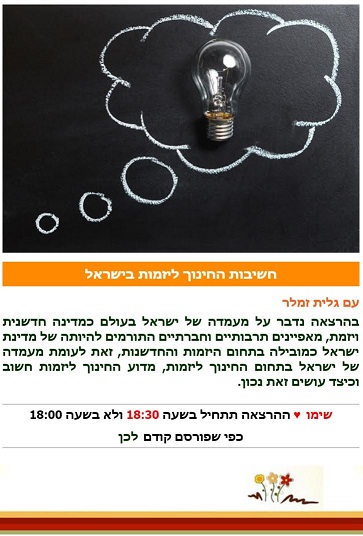
During her talk to the attendees, Galit Zamler spoke about the importance of education for entrepreneurship in Israel.
Galit also discussed Israel's status in the world as an innovative and entrepreneurial country, highlighting the cultural and social qualities that contribute to Israel's rise in leadership.
And yet, why, despite its leadership, is education for entrepreneurship essential? And how to do it the right way?
The diverse audience showed genuine interest in the lecture and interacted with thoughtful comments and questions.
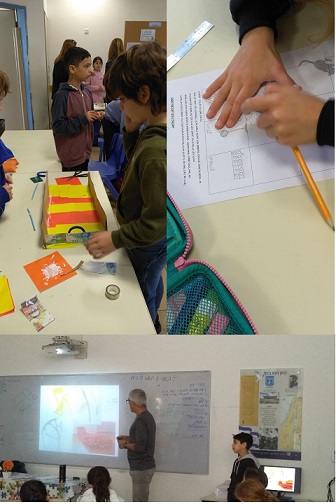
The Yitzhak Navon School in Shoham, directed by Vered Biali, held an enriching parent day.
One who organizes such events is aware of the difficulty in recruiting volunteer parents, but the school, which is participating this year in an institutional course in the field of entrepreneurial education, has defined the day around entrepreneurship.
The result: Many parents felt a connection to the topic of entrepreneurship and volunteered to give lectures and workshops to students.
There were recycling workshops, product preparation, buying, and selling. There were also workshops, such as notebook design for project ideas, authoring inspiring stories about various inventions, and personal entrepreneurship.
The students also learned about event production, business entrepreneurship, medical products, social entrepreneurship, tools to succeed in life, the Israeli Iron Dome project, innovative entrepreneurship and product development, the state of Israel as an entrepreneurial nation, social entrepreneurship, making dreams come true, and innovation in the medical field.
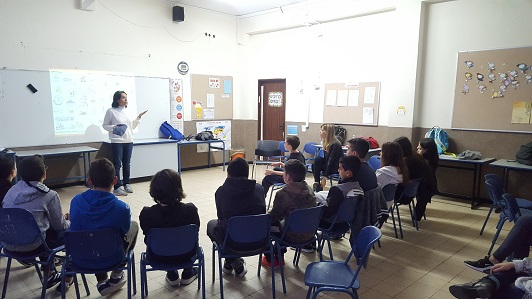
During an enriching day for students, Galit Zamler delivered a one-time lecture to sixth graders on the subjects of critical thinking and handling peer pressure as part of the entrepreneur's skills.
The students learned about Israel being a leading country in entrepreneurship and innovation. They brought up skills that they believe characterize entrepreneurs, played a trivia game and watched a video that made them think about how much they act on a daily basis as a result of peer pressure, and how much they use critical judgment.
At the end of the lecture the students delivered the following letter of gratitude:
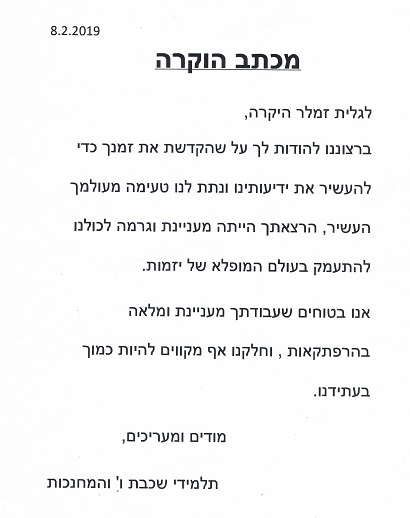
"A gratitude letter to the dear Galit Zamler.
We would like to thank you for devoting your time to enriching our knowledge and for sharing a glimpse of your vast world with us.
Your lecture was interesting and made us all intrigued by the wonderful world of entrepreneurship.
We are sure that your work is both interesting and adventurous, and some of us even hope to follow in your footsteps in the future.
In great thanks and appreciation,
The students of the 6th grade and the teachers"
The entrepreneurship curriculum for kids is also taught to teachers as an institutional training course.
Throughout the training process for teachers to implement the program, they participate actively in studying, which includes workshops, discussions, personal expression, and enjoyment.
The advantage of this process is that teachers experience the entrepreneurship lessons they will later teach to students in the classroom.
Following are photos from training course meetings:

The Be'Shvil program of the Jerusalem Volunteer Association prepares students for their social volunteering and accompanies them throughout their first year of social volunteering, which typically begins in the 10th grade.
Galit Zamler was invited by the program to meet with 9th graders at the Boyar High School in Jerusalem, where she discussed social entrepreneurship, the process of turning an idea into an actual plan, and the fact that even though they are only 9th graders, they can create and initiate meaningful social activities.
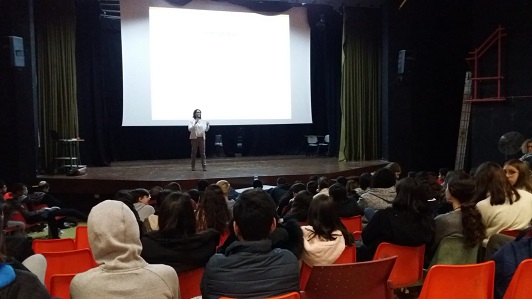
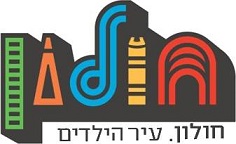
The Holon Municipality held a Hackathon event with the participation of principals, teachers, parents, and students.
Galit Zamler was invited to give a lecture on creative thinking.
The lecture combined experiential activities with the audience, prompting participants to think outside the box and prepare them for openness during the idea-raising process of the Hackathon.
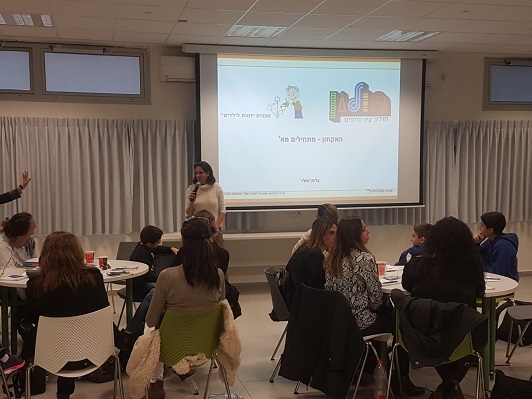
Sixth graders at the Yisgav School in Tel Aviv are currently enrolled in entrepreneurial classes.
Galit Zamler came as a guest lecturer and exposed the students to the entrepreneurial arena.
The children ended the meeting with the feeling that they, too, could be entrepreneurs.
In the photo, the students participate in an activity of daring and getting out of the box.
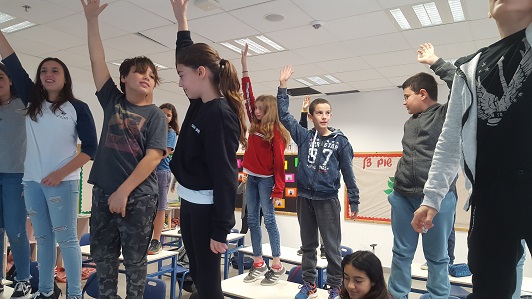
The Bachar School in Even Yehuda, led by Etti Hodeda, hosted a delegation of leading educators from developing countries and guests of
The visit undoubtedly inspired members of the delegation and encouraged them to apply at least some of the teaching methods in their countries.
Other attendees were the head of the Even Yehuda council, Mr. Avi Harari, head of the Education Department in Even Yehuda, Dr. Shay Prochtmann, and Yossi Michal, supervisor of Student Rights in the Ministry of Education.
The preparations for the visit, the visit itself, and the feedback received from the delegation enabled the school staff to understand that their work is unique, meaningful, and has earned many achievements.
Following the visit, teacher Michal Senior noted: "This is one of the most exciting days in Bachar school. I was happy to see the students as full partners in all the educational activities. Thank you for allowing me to talk about the children's organization that the students developed and how they took a leadership role."
Ariel Segala, from the Ofri Center, thanked the school in a letter:
"Our delegators were incredibly impressed with the school, and with its working model, from the various pedagogic and educative methods and the way that 21st-century skills are taught and developed from a young age.
The delegators were greatly impressed by the entrepreneurship and innovative processes that occur in a very successful and holistic manner in the school.
The delegators wanted to thank you for the fantastic reception, the warm welcome, and your educational professionalism.
Your work is an example of human, ethical, and professional work that nurtures and develops a meaningful, innovative, and relevant education that meets the needs of every child.
In the name of the Ofri Center, the Center for International Cooperation, and the Ministry of Foreign Affairs, I wish to thank you all from the bottom of my heart.
We wish you all the best."
A presentation summarizing the visit:
At the end of the visit, the delegation members participated in a workshop on the importance of entrepreneurship education in schools, led by Galit Zamler.
Throughout the workshop, we also addressed entrepreneurial skills, labor market requirements, openness to change, and stepping out of one's comfort zone.

The delegation members noted their impressions of the visit and the workshop:
"Thank you for your inspirational, successful case study."
"Hopefully, we'll implement a lot of things in Ukraine using your experience."
"I was really impressed with this school and what you do!"
The Sadot School in Pardes Hanna Karkur, under the direction of Talmor Klus, fosters innovative entrepreneurial thinking in its students.
Every year, the school organizes a fair showcasing entrepreneurial products, to which the community is invited to watch students present their projects, be impressed, and even purchase the best of the children's products.
Photo Gallery of the Entrepreneurship Fair:
The Bechor Levi School in Rehovot, under the management of Yafit Narbat, held an end-of-year event named "The Academon Chick".
At Academon, the school offers students the opportunity to select an annual course that meets once a week on Fridays.
The Entrepreneurship Program for Kids was one of the elective courses, titled "Invitation to Invention."
The teacher, Mali Ben Simhon, led the entrepreneurship course for fifth- and sixth-grade students, while Rivka Cohen led the course for third- and fourth-grade students.
The students had lovely ideas for the projects, and they proudly presented them to their parents.
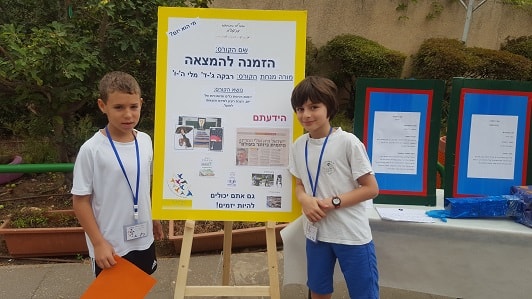
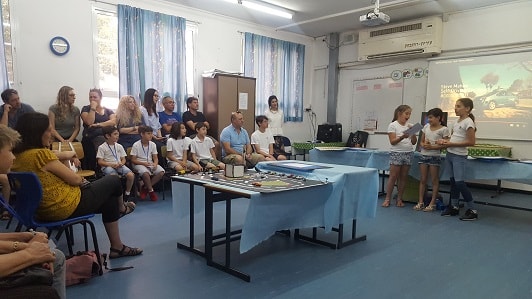
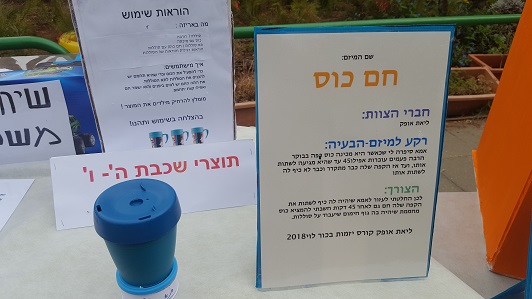
Teacher Rivka summed up the year: "The program raised the students' self-esteem. They discovered other strengths that they have.
Some children wanted to develop their ideas independently, but the condition was that they had to work as a team, because this is a required skill in life today. In the end, they all succeeded."
Read in detail about the social project and the students' inventions as presented at the conference.
Read the letters sent by teachers Mali and Rivka to Galit Zamler at the end of the year.
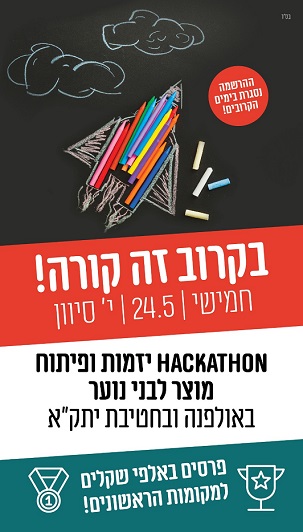
Students from the Yeshiva High School and the Ulpana in Kiryat Arba were invited to participate in the first Hackathon for youth in the community.
Over sixty students have responded to the Hackathon challenge, raised numerous ideas for projects, selected the best, built models for these projects, prepared pitches and presentations, and participated in a school competition, where two winning projects were chosen at each school.
Then, all twelve groups participated in the Hackathon, presenting their projects to a large audience at Heichal HaTarbut in the community. The four finalists then presented their ideas on stage. Three of them won prizes.
Students at the Yitzhak Shamir School in Holon, led by Moshe Eini, participated in an annual entrepreneurship course. The learning process included developing entrepreneurial, creative, and critical thinking, as well as the ability to identify problems and solve them.
The students came up with many ideas for inventions. They examined and prioritized them, leaving only a few ideas in each classroom.
Over two intensive days, after the teams were formed for each idea, the students built models for their inventions, accompanied by accompanying presentations.
Just before the end of the course, the students presented their ideas briefly in the style of an "elevator pitch."
Dina Arkin moderated the course on behalf of the Entrepreneurship for Kids Program.
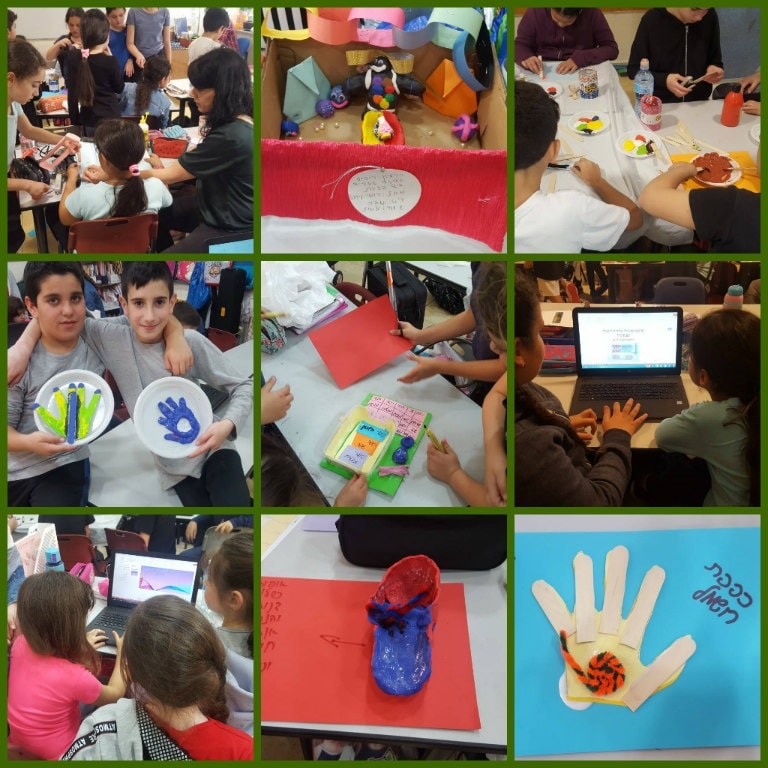
The young entrepreneurs of the Bechor Levi School in Rehovot, who choose an entrepreneurship course, learn two hours a week about the entrepreneur's skills, identify opportunities, raise ideas for projects and initiate by themselves.
As future entrepreneurs, the students understand the importance of creative thinking and teamwork, and in one of the sessions, led by teacher Mali Cohen, they participated in an activity that combined these two skills.
The students enjoyed and created together as a team, creative Lego models.
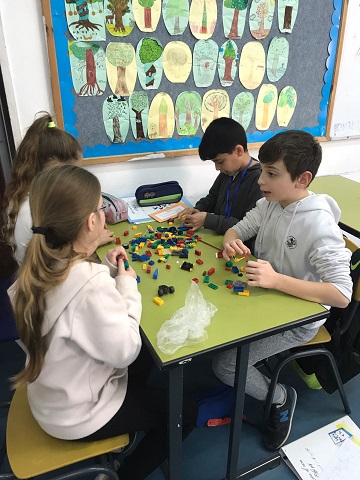
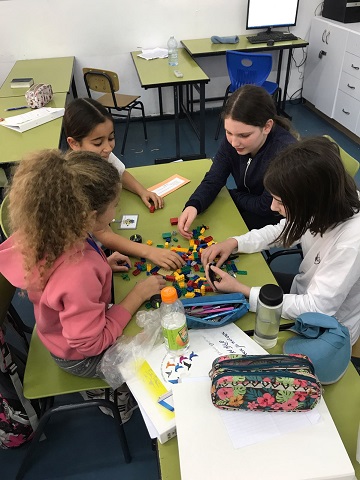
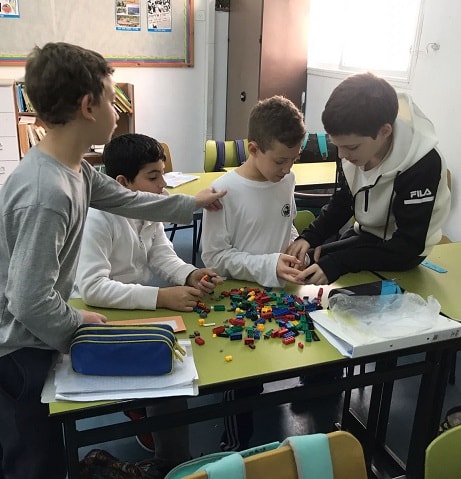
The two sixth graders, who are about to complete their studies this year at the Rivka Guber School in Moshav Nehora, decided, together with their parents, the principal, and the educators, to leave their mark on the school.
For this purpose, the students participated in a workshop on developing entrepreneurial thinking led by Galit Zamler.
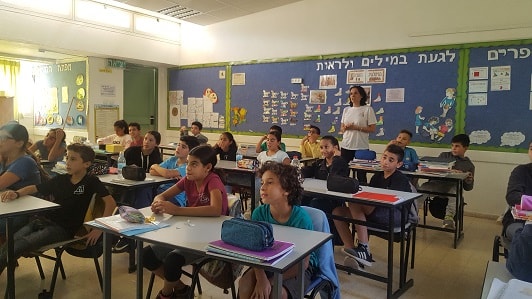
Then they formulated into groups, raised ideas for projects, and each group focused on planning one project. The parents accompanied the students and visited the school once a week to develop the ideas.
Each group of children defined why their project was worthwhile, what need it meets, how to implement it, expected problems, and how to deal with them.
The students prepared presentations, videos, and an elevator pitch for a record event, during which they presented their project ideas to the school principal, educators, parent representatives, and all students.
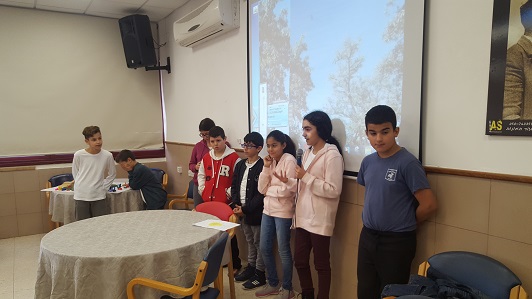
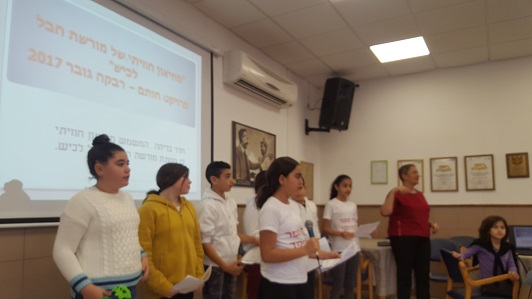
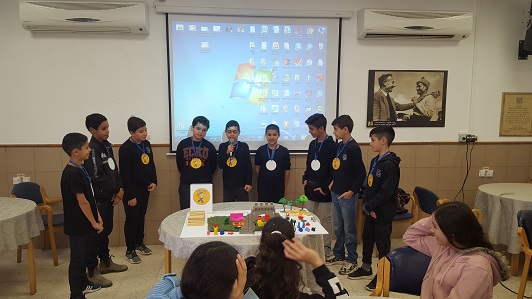
On Friday, the excited students visited the elderly home in the Moshav for an event where they presented their project ideas. It was an elevator pitch event to convince their friends and all attendees to support their initiative.
The event was attended by Mrs. Adina, who is responsible for scientific education in the southern district.
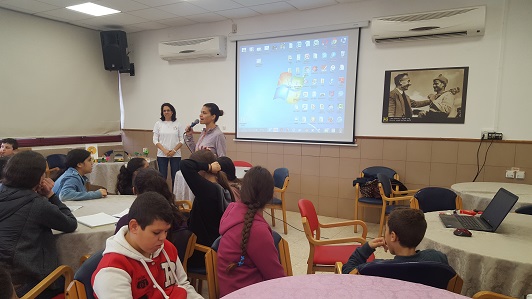
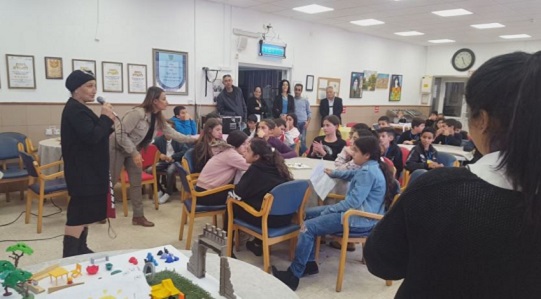
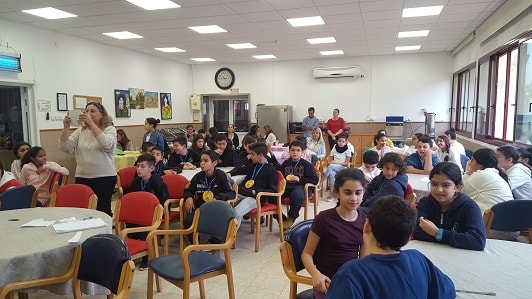
After presenting the projects, the students participated in a game led by Galit Zamler that illustrated to them the importance of a vote while ignoring peer pressure.
Each student voted for two ideas, and eventually, one project received the most votes. It will be implemented by all the students together as a team, with the help of their parents.
The school principal, Drorit Garla, shared her insights from the process the students had undergone so far. She praised them for their investment, attention to detail, and their ability to present themselves impressively to the audience.
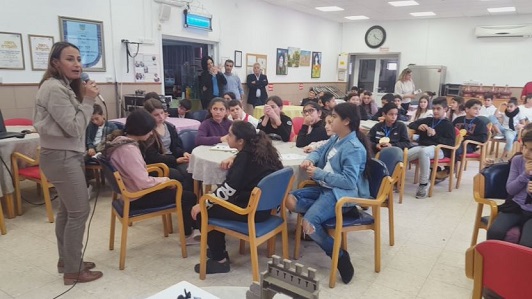
Four fourth graders at the Yitzhak Shamir School in Holon, run by Moshe Eini, participate in an entrepreneurship class, which takes place once a week in the morning.
The students have learned to be alert to their environment, identify needs, and generate ideas for projects.
They collect into a basket ideas resulting from experience, a problem, or a need, such as the one in the picture:
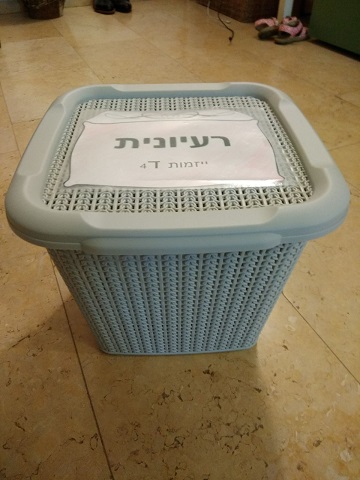
This presentation sums up the children's ideas:
The students learned why it is essential to check whether their idea already exists or not, and how to search the internet. Together, they sat in front of computers and checked whether the ideas presented in the classroom had already been realized.
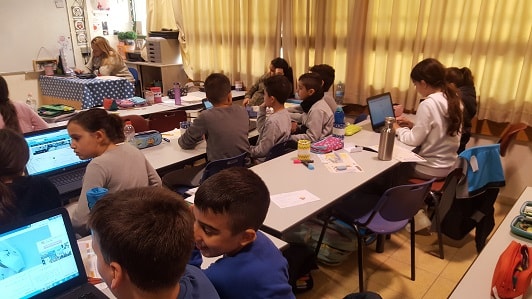
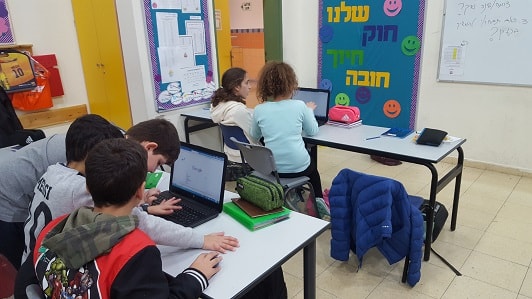
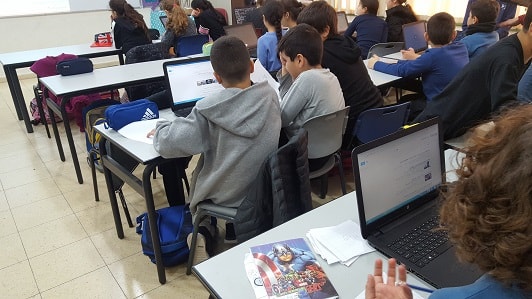
When the entrepreneurial children reached the stage of preparing a business plan for their projects, they learned about vision and goal setting, as exemplified by Elon Musk's vision of launching a sports car into outer space.
The first school in which Galit Zamler and Nimrod Segev collaborated was Ofek School in Ramle, under the management of Dorit Nevo.
Students from the school participated in a Hackathon that dealt with natural resources. Click on the link for more details.
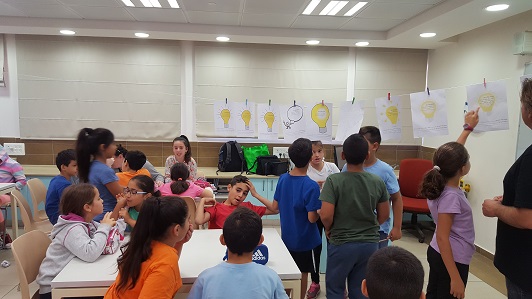
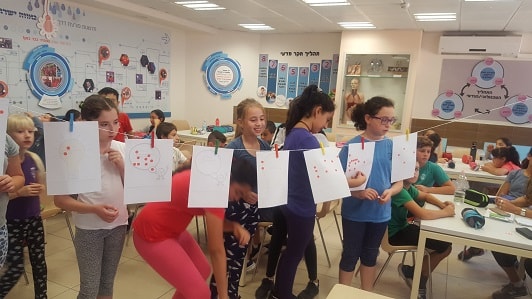
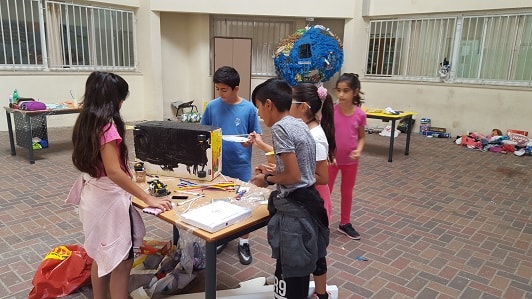
The Sadot School in Pardes-Hanna-Karkur has hosted an annual entrepreneurship fair at the school for several years.
This year, as in previous years, the students presented their products to their parents and the fair visitors, showcasing the ventures and initiatives they had developed and realized during the past school year.
This is the map of the school fair:
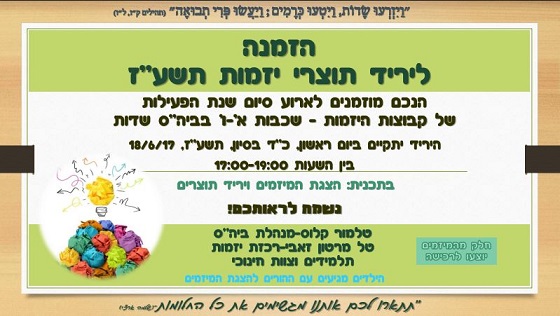
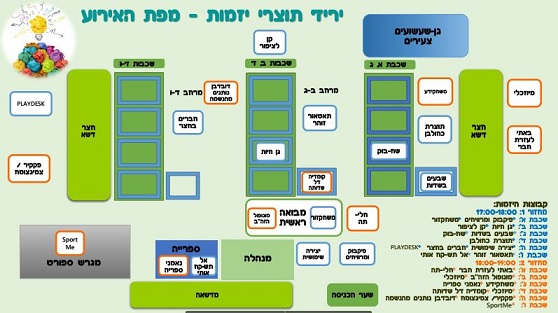
The EFK Program held empowerment meetings with third graders from the Avnei HaChoshen School in Shoham.
During the first session, the children listed their strengths. We went through some of them and understood together that when someone mentions their strength, for example, soccer, we can learn a lot about them, such as the ability to work in a group, persistence, physical fitness, and more.
The two sessions with each class focused on three entrepreneurial skills: taking risks, dealing with failure, and creativity.
The students learned each of these skills experientially while playing games and actively participating in the learning process.
In the photo, the students are exercising, taking a risk, collaborating with friends, and showing persistence.
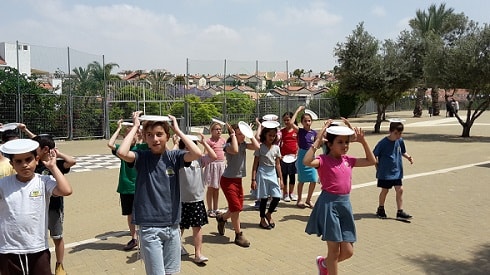
We concluded the lesson on creative thinking by completing a creative painting, which stimulated each student's imagination.
We put some of the students' paintings in the presentation.

A group of fifth- and sixth-graders from the Ussishkin School in Ramat HaSharon, who participate in the Entrepreneurship for Kids Program led by Miri Molcho, went on a tour of PayPal's Israeli company offices.
The students met with the Israeli CEO, the sales manager, and the information security manager.
They heard about the process of developing the company, how the company detected a need in a safe way to transfer money from and to everywhere in the world, how they defined the audience for their product and developed a win-win solution for both sellers and buyers, and how PayPal has become a leading company in its segment.
The students enjoyed excellent hospitality, ate pizzas, and played in the employees' gaming area.
The students enjoyed the visit and were very interested in the explanations provided by the company's executives.
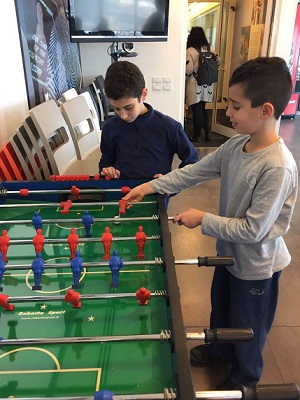
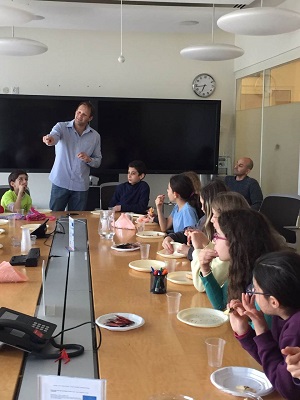
The Pirchei Hamada School in Rehovot promotes entrepreneurship and utilizes the Entrepreneurship for Kids Program curriculum to teach entrepreneurial skills to students in second and third grades.
The school hosted a private event, "School Entrepreneurship Week," and invited many entrepreneurs to share their experiences with the students.
Galit Zamler also appeared as a guest entrepreneur and lectured to the fifth graders.
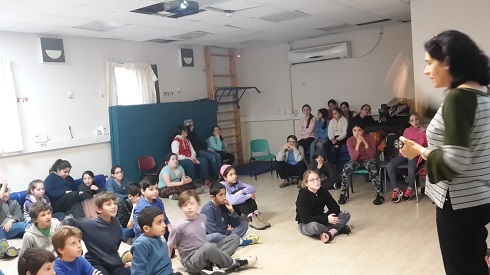
Students in the entrepreneurial program at the Hashalom School in Mevasseret Zion participated in a 24-hour Hackathon event, sleeping in the school under the direction of teacher and deputy director Sigal Bar.
Click to read more about the Hackathon for students with sleeping bags.
At the Aliyot school in Ramat Gan, two fourth-grade classes participated in the EFK Program guided by their teacher, Levana Greenfeld.
During the year, the students underwent a process of thinking about and developing entrepreneurial ideas, which they presented in a summary presentation prepared by each, explaining their project/initiative.

The primary guideline for building the showcase was that the presentation should speak for itself - that with no added explanation, the viewer would understand the presentation. This was achieved by integrating pictures and sketches that illustrated the idea, along with a verbal explanation.
The students delivered their presentations in front of their peers, thereby practicing public speaking.
Levana summarizes: "It was very successful, students stood in line to present their ideas."
Students also offered time for a Q&A after every presentation. They understood that not all questions must have an immediate answer and that they can take the time to think, but that it is essential to listen carefully to all questions, needs, and restrictions.
Read about many other events and experiences on the "Experiences from the program" page - part I.